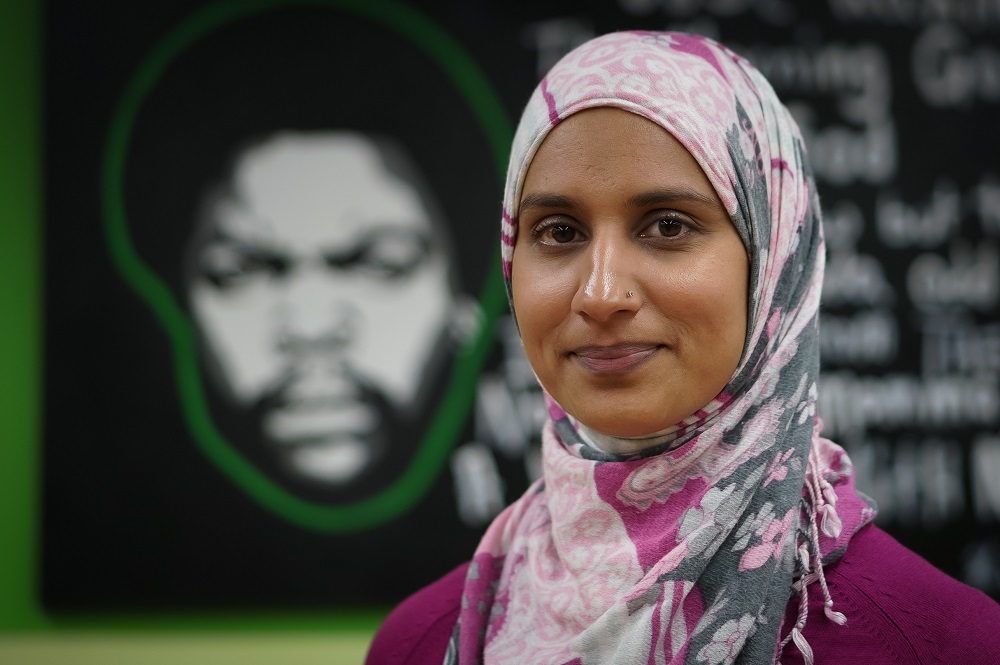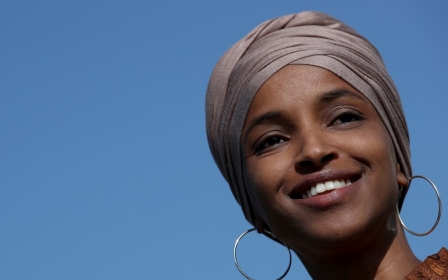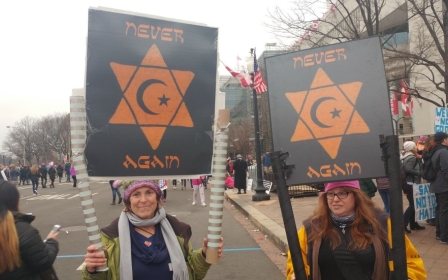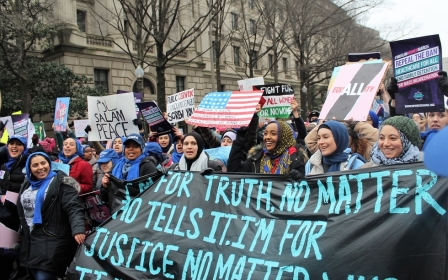Why many Muslim women in the US are skipping the Women’s March this year

Asma Elhuni says she is done with the national Women’s March.
A devoted attendee and participant since 2017, she even spoke at Vermont's March in 2019. But the community organiser says she no longer sees a place for herself within the movement.
“This year I made a clear stand that I will not be going because their feminism and human rights [advocacy] is very selective,” she told Middle East Eye.
“If you are really for the liberation for women, then you should seek the liberation for all women and the Women’s March doesn’t do that,” Elhuni added.
'They need to know: leaving Palestinian women out, leaving Muslim women out, is not okay'
- Asma Elhuni
The Women’s March is a US nonprofit group that evolved from the initial Washington march in 2017 following President Donald Trump's inauguration.
The movement describes itself as a platform "created by women and for all people" with a mission to enable everyone to live safely and "free from structural impediments".
But Elhuni is one of a growing number of Muslim women and women of colour who have publicly disavowed the Women’s March this year over repeated concerns that the movement remains overwhelmingly white and tone-deaf to the issues faced by other communities.
“This country has a history of a type of feminism that leaves out certain women. Through the Women’s March, this practise of valuing the experience of some women over others continues today,” Elhuni said.
A number of Muslim women say the March is neither inclusive nor interested in moving beyond Muslims and women of colour as tokens.
Nausheena Hussain, who was on the advisory board of the Minnesota chapter of the March in 2019, told MEE that the way some progressive spaces treat outspoken Muslim women is not very encouraging for others looking to get involved in public service.
“Watching Linda Sarsour and then seeing Zahra Billoo included on the board - you know, people who speak up on issues - was a big deal. But then the moment they spoke up, they were attacked and attempts [were] made to silence them," she said.
“A lot of Muslim women see how vulnerable these women are because they speak out and then choose to steer clear from these positions as a result,” the executive director of Reviving Sisterhood, a Minneapolis-based non-profit, said.
Sarsour, a community activist based in New York City, was one of the co-chairs of the March. As an outspoken Palestinian-American, she routinely faced accusations of antisemitism throughout her tenure.
In mid-2019, she stepped down from the board.
Silencing the community
The Women’s March has been under intense scrutiny since it voted off activist Billoo from the board over her criticisms of Israel, which her detractors called antisemitic - an allegation ultimately endorsed by the board when it dismissed her.
The decision created a wedge within the Women’s March, and for months, concerned activists have sought clarity from the March over the treatment of Billoo, only to be met with silence. Marcie Wells, a member of the 2019 steering committee, resigned over the affair.
Elhuni, the community organiser from Vermont, says that for the March to sideline Billoo, who speaks out about issues facing the community, it was akin to silencing the community itself.
“She has spoken up on profiling by the FBI, and the Muslim ban, and she has a long history of speaking up on important issues that matter to us,” Elhuni said.
Billoo told MEE that the Women’s March “has had many months to make things right with Arab and Muslim communities”.
“Unfortunately, they haven’t done so,” Billoo said.
The Women's March did not reply to Middle East Eye’s request for comment.
In a statement released in September, the March said that Billoo had been removed with immediate effect after concluding that "some of her public statements [were] incompatible with the values and mission of the organisation".
But it is not just Muslim women who feel marginalised by the Women’s March.
Similar complaints of one-dimensional politics have also been levelled by others who argued that the Women’s March did not take up issues close to the Black community, such as police brutality.
Tokenism
But Zainab Khan, a community organiser based in Atlanta, says that a lack of intersectionality has dogged the March from the very beginning.
“I went for the first one in 2017. And immediately, I didn’t feel that my values were represented. I felt tokenised.
“I remember there were these posters of a Muslim woman in an American flag hijab. That is all I needed to know,” Khan says.
'I remember there were these posters of a Muslim woman in an American flag hijab. That is all I needed to know'
- Zainab Khan, a community organiser
Observers say the lead-up to this year’s event has been a lot quieter than normal, which is a sign that all is not well within the movement.
While the first edition of the March and its sister events drew millions across the country, observers aren’t predicting a similar turnout this year.
“I think the jury is still out as to what the purpose of the March is today," Hussain said.
“We still need to figure out what it has achieved besides bringing people to the streets.”
Ruby Khan, a student activist based in NYC, told MEE that the failure of the movement to be intersectional, together with what she calls “collective compassion fatigue”, means she doesn't foresee as big a turnout as there was in 2017.
Ruby Khan said that though the turnout has been in decline, she wouldn’t completely discount “the efforts of gender, queer and women’s interest groups who meet on the eve of the march to coordinate and reflect on shortcomings”.
On Thursday, Mei Mei Chan from Equality Rights, a group that advocates for gender justice in workplaces and schools across the country, argued that there were many reasons to be upset with the movement.
“For many people, the fact that the Women’s March has made so many decisions in conflict with their mission is good enough reason to cancel them,” Chan wrote.
“Today, I’m not casting aside the Women’s March. I hope that in the future the Women’s March won’t cast me aside, either.”
But Elhuni says it's imperative to take a stand.
“If we don’t send a message, this will continue. They need to know: leaving Palestinian women out, leaving Muslim women out, is not okay,” she said.
Middle East Eye propose une couverture et une analyse indépendantes et incomparables du Moyen-Orient, de l’Afrique du Nord et d’autres régions du monde. Pour en savoir plus sur la reprise de ce contenu et les frais qui s’appliquent, veuillez remplir ce formulaire [en anglais]. Pour en savoir plus sur MEE, cliquez ici [en anglais].





